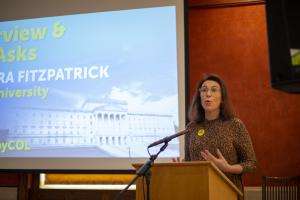Stormont urged to act now on cost of living crisis

Published by Professional Social Work magazine, 17 October, 2022
The NI Executive parties are being urged to put aside political differences and act now to protect low-income households from the worst of the cost of living crisis this winter.
Four emergency measures drawn up by anti-poverty campaigners have been presented to MLAs and a template letter is being circulated so that pressure can continue to be applied even in the absence of a working government at Stormont.
Speakers at the Crushed by the Cost-of-Living Crisis: The Time to Act is Now conference - attended by more than 500 delegates - told of their extreme hardship and fears for the months ahead.
Deirdre McCausland, a single parent and survivor of domestic violence, said: “As an active member of my community I talk to bin men, to taxi drivers, to people who work in local cafes and shops, known as the ‘working poor.’
“They are terrified this winter. We are being crushed by the rising cost of living.
“The reality of what is happening in Northern Ireland is that people won’t be able to cope and depression will set in. And to be quite blunt, there will be loss of life if it’s not sorted out. The cost of living crisis has become a mental health crisis.”
Many were angry about the lack of action from government. Anti-poverty campaigner and Ulster University academic Dr Ciara Fitzpatrick, who organised the event in partnership with the Women’s Support Network and BASW NI, described the coming months as “a crisis of epic proportions.”
She said: “Without leadership and action from the politicians that represent us all, we risk seeing thousands more households facing the indignity of destitution this winter.”
The four emergency measures proposed at the event were outlined by Andy McClenaghan, Public Affairs, Policy and Communications Lead, BASW NI, who said: “We want to see an end to social security debt deductions from low-income households.
“We're calling for the reinstatement of the Universal Credit £20 uplift and the extension of the uplift to legacy benefits. We want a one-off payment of £500 for those entitled to disability benefits or Carer’s Allowance to recognize the additional costs of disability and caring. And finally, we want to see the removal of the two-child limit for Universal Credit and Child Tax Credit so that families receive benefit entitlement for every child to ensure no child goes hungry.”
Measures have been costed for a period of six months from October 2022 to April 2023 and seek to release money ‘stuck in the Department of Finance’ due to the absence of a functioning NI Executive.
- Reinstating the Universal Credit £20 uplift would cost £144m over six months
- A one-off payment of £500 to people claiming disability benefits or carer’s allowance would cost £195m
- Removing the two-child limit for Universal Credit and Child Tax Credit would cost £32m
- Pausing social security debt deductions would result in no additional cost.
Dr Fitzpatrick said: “Society is facing an acute and unparalleled crisis. While these measures will come at a significant cost to the public purse, there are also costs associated with a failure to act, borne by individuals and families across Northern Ireland.”
Cost of living NI fact file
- By January 76 per cent of NI households will be in fuel poverty (NEA 2022)
- 1 in 10 households are skipping meals to cover energy costs (NEA 2022)
- 36 per cent of households have no savings (Family Resources Survey)
- 80 per cent of rural homes run on home heating oil – prices have more than doubled in a year (Rural Community Network)
- 12 per cent of pensioners in rural areas live in absolute poverty
- 21 per cent of workers in NI are paid below the living wage (Living Wage Foundation)
- More than half of low-paid workers use food banks, a fifth skip meals and a third can’t heat their homes
- 26 per cent of children in NI currently live in poverty (End Child Poverty)
- Children in the most deprived areas of NI are six times more likely to be placed on the Child Protection Register than those in the least deprived areas (QUB)
- There are around 300,000 unpaid carers in NI (Carers NI)
- Nearly half of carers responding to a recent State of Caring survey said they were struggling to survive
- Carers are three times more likely to live with food insecurity
- The average energy bill in a disabled household is now £1,500 to £1,800 a month, (Disability Action)
- 60 per cent of women say rising costs are impacting on their ability to repay debts (Women’s Regional Consortium)
- Half of renters are spending 40 per cent or more of their income on rent (Renters’ Voice)
